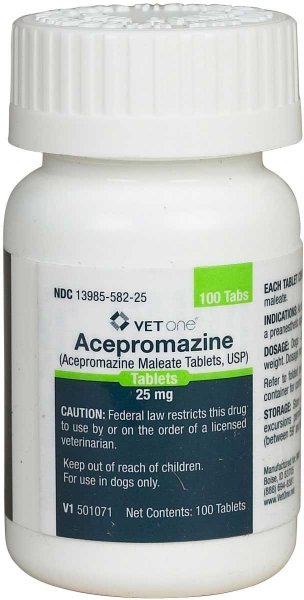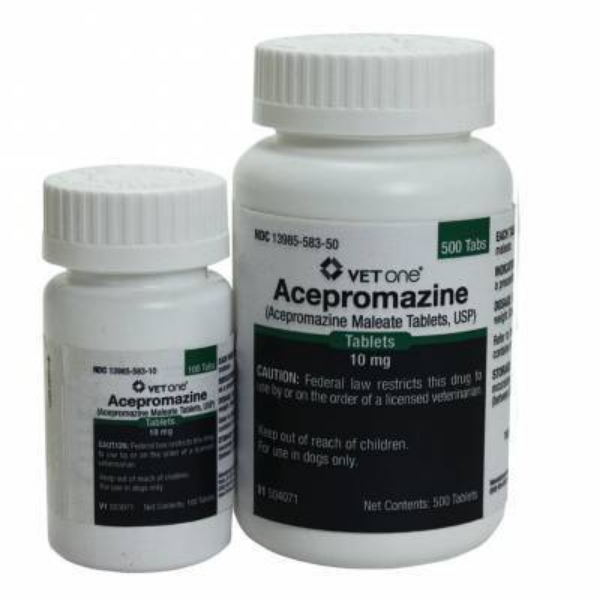Acepromazine is a drug used in veterinary to calm and nominate animals, and is sometimes used to treat mental disorders in humans.
The drug belongs to the traditional antipsychotics category.
How to use Acepromazine:
You should consult a veterinarian before using the medicine and follow the doctor’s instructions regarding the dose and timing.
The medicine can be taken by mouth or injection, and the recommended dose should not be exceeded whatever happens
Acepromazine side effects:
Acepromazine can cause some side effects such as:
drowsiness, dizziness, nausea, constipation, diarrhea and vomiting,
The veterinarian must be contacted in the event of any of these symptoms, especially if they are dangerous or disturbing.
Acepromazine pharmaceutical doses:
The recommended dose of ACepromazine varies depending on the type of animal and its health condition.
The recommended dose should not be exceeded, whatever happens.
Contraindications and warnings for the drug:
The use of the drug should be avoided if there is an allergy to any component of the drug or if any previous allergy to these substances is present.
Consult the veterinarian before using the drug in the event of pregnancy or breastfeeding,
The drug should not be used in the event of some specific diseases such as epilepsy and liver failure.
Be careful to use the drug if other medications that affect the central nervous system.
Acepromazine manufacturer:
Acepromazine is manufactured by several different pharmaceutical companies around the world,
It is available in most pharmacies under several commercial names such as Promace, AceProject and others.
The medicine should be purchased from a reliable source and avoid buying the drug from unknown or unreliable sources.
In the end, the owners of animals who are considering using Acepromazine
should contact the veterinarian before starting to use the medicineAnd follow the doctor’s instructions on doses, warnings and contraindications,
and reporting any side effects or health problems that occur during the use of the drug.
Any other drugs or nutritional supplements that are taken, should be reported to avoid any unwanted pharmaceutical interventions.
The use of the drug in animals with respiratory disorders, heart, liver, or kidney disorders should be avoided.
Be careful to use the medicine in animals that suffer from epilepsy or take other medications that affect the central nervous system.
Animal owners should also take the necessary precautions when using the drug,
Such as providing a quiet animal environment and constantly monitoring it to ensure that there are no unwanted reactions.
In the end, the veterinarian’s instructions should be adhered to on the use of AcepromazineCarefully monitor the animal to ensure that there are no side reactions or other health problems.
Also, you should avoid handling of the drug and ensure that it is stored properly according to the manufacturer’s instructions.

Site links for manufacturers of ACEPROMAZINE:
1. Zoetis: https: //www.zoet.com
2. ENACO Animal Health: https://www.elanco.com/
3. Boehringer igelheim Animal Health: https://www.boehringer- Ingelheim.com/
4. Bayer Animal Health: https://www.bayranimalhealth.com/
5. Virbac: https://www.virbac.com/
6. CEVA Santé Animale: https://www.ceva.com/
These are some Reputable Pharmaceutical Companies that Manufacture Acepromazine
and Other Animal Health Products.
It’s Always Advisable to Consult with a Veterinarian Before Adminismismness Any Medicalism to your Pets.
One of the main features of Acepromazine:
1. Behavior improvement: Acepromazine can be used to improve aggressive behavior and unwanted behavior of pets, and can also be used to facilitate training.
2. Reducing tension: Acepromazine can be used to relieve stress and anxiety in pets during trips or visits to the veterinarian.
3. Anesthesia: Acepromazine can be used as part of the general anesthesia treatment of pets.
4. Long -term effect: Acepromazine effect lasts for a long time, allowing the number of doses required by the animal.
5. Ease of use: Acepromazine can be given by mouth or injection.
Some medications that should be avoided while using AcePromazine:
1. antidepressants: ACepromazine should be avoided with antidepressants because it can increase their effects.
2. Anti -convulsive medications: ACepromazine should be avoided with anti -spasms because it can increase their effects.
3. Antihistamine medications: ACepromazine should be avoided with antihistamine medications because it can increase their effects.
Drug shapes:
The forms of this drug are usually available in the form of an injection or tablets.
The appropriate dose for the pet is determined according to its health condition,
weight and the type of treatment required.You should consult a specialized veterinarian before using this medicine.
The most common side effects of Acepromazine include:
Smoothness and fatigue as the drug can cause a decrease in blood pressure and inflammation in the injection site, as well as reduce sexual stimulation of animals.
It is worth noting that the use of ACepromazine should not be the first option to treat anxiety and tension in pets, and the basic causes of anxiety
and treatment must be searched before resorting to the use of medications.In general, you should consult a veterinarian before using any pet medicine,
and the recommended doses and the correct instructions should be followed to ensure the safety of the animal and the effectiveness of the required treatment.
Acepromazine can be used to treat many cases in pets, including anxiety,
tension, cramps, aggression, vomiting, nausea and anesthesia.It can also be used to facilitate medical procedures such as medical examinations and simple surgeries.
Acepromazine is one of the common options for anxiety and stress in pets, and it can be used regularly to improve behavior and reduce anxiety in animals.
It can also be used to facilitate training and improve aggressive behavior.
Some guidelines:
Acepromazine should be avoided with some other medications: such as anti -depressants,
anti -spasms and antihistamine drugs, as it can increase the effects of these medications.
Care must be taken when using this medicine in pets, and the veterinarian should be consulted before using any animal medicine.
Some important points should be taken care of when using Acepromazine in pets:This medicine should be avoided for pregnant animals and infants,
as it can affect the development of the fetus and the infant.
– This medicine should be avoided in animals that suffer from health problems such as liver, kidney and heart problems, as it can increase their effects.
– You should consult a veterinarian before using this medicine to ensure the appropriate dose and the appropriate period for treatment,
as well as to determine if this medicine is the best option for an animal that suffers from anxiety and stress.
– The correct instructions for the dose, storage and disposal of the drug must be followed in a correct way,
as the drug can cause harm if it is incorrectly used or if it is eliminated in an incorrect way.
– You should also pay attention to any changes in animal behavior or any unusual side effects, and stop using the medicine and contact the veterinarian if there is any problem or concerns.
in general:
Acepromazine can be safely used in pets,
but care must be taken when using it and follow the correct instructions and obtain a veterinarian consultation before using it.
Caution should be taken when using it in animals that suffer from health problems or taking other medications, and the animal should be carefully monitored during treatment.
Acepromazine should be used with caution in animals that have health problems such as heart, kidney and liver problems, and this may require adjustment of the dose.
This medicine should be avoided in pregnant animals, infants and animals that suffer from allergy to the drug.
You should consult a veterinarian before using ACepromazine in pets, and the correct instructions for the dose, storage and disposal of the medicine should be followed in a correct way.
The animal should be carefully monitored during treatment and stop using the medicine and contact the veterinarian if any unusual symptoms or problems appear.

